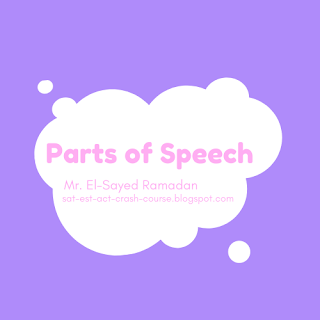Parts of Speech
1-Noun
names a person, a place, a thing, an idea, a quality, or an action
- Common
serves as a general name, or a name common to an entire group
boat, anchor, water, sky
- Proper
names a specific person, place, or thing
Nile River, Acapulco, Swahili
- Singular
refers to a single person, place, thing, or idea
map, berry, deer, mouse
- Plural
refers to more than one person, place, thing, or idea
maps, berries, deer, mice
- Concrete
names something that can be perceived by the senses
stone, crate, wall, knife
- Abstract
names something that cannot be perceived by the senses
courage, caution, tyranny, importance
- Compound
expresses a single idea through a combination of two or more words
toothbrush, sister-in-law, South Carolina
- Collective
refers to a group of people or things
herd, family, team, staff
- Possessive
shows who or what owns something
Kenya’s, Les’s, women’s, waitresses’
2-Pronoun
takes the place of a noun or another pronoun
- Personal
refers to the person making a statement, the person(s) being addressed, or the person(s) or thing(s) the statement is about
I, me, my, mine, we, us, our, ours, you, your, yours, she, he, it, her, him, hers, his, its, they, them, their, theirs
- Reflexive
follows a verb or preposition and refers to a preceding noun or pronoun
myself, yourself, herself, himself, itself, ourselves, yourselves, themselves
- Intensive
emphasizes a noun or another pronoun
(same as reflexives)
- Demonstrative
points to one or more specific persons or things
this, that, these, those
- Interrogative
signals a question
who, whom, whose, which, what
- Indefinite
refers to one or more persons or things not specifically mentioned
both, all, most, many, anyone, everybody, several, none, some
- Relative
introduces an adjective clause by relating it to a word in the clause
who, whom, whose, which, that
- Reciprocal
expresses a mutual action or relationship
each other, one another
2-Verb
expresses an action, a condition, or a state of being
- Action
tells what the subject does or did, physically or mentally
run, reaches, listened, consider, decides, dreamed
- Linking
connects the subject to something that identifies or describes it
am, is, are, was, were, sound, taste, appear, feel, become, remain, seem
- Auxiliary
precedes the main verb in a verb phrase
be, have, do, can, could, will, would, may, might
- Transitive
directs the action toward someone or something; always has an object
Mom broke the plate.
- Intransitive
does not direct the action toward someone or something; does not have an object
The plate broke.
3-Adjective
modifies a noun or pronoun
frightened man, two epics, enough time
4-Adverb
modifies a verb, an adjective, or another adverb
walked out, really funny, far away
5-Preposition
relates one word to another word
at, by, for, from, in, of, on, to, with
6-Conjunction
joins words or word groups
- Coordinating
joins words or word groups used the same way
and, but, or, for, so, yet, nor
- Correlative
used as a pair to join words or word groups used the same way
both . . . and, either . . . or, neither . . . nor
- Subordinating
introduces a clause that cannot stand by itself as a complete sentence
although, after, as, before, because, when, if, unless
7-Interjection
expresses emotion
whew, yikes, uh-oh
